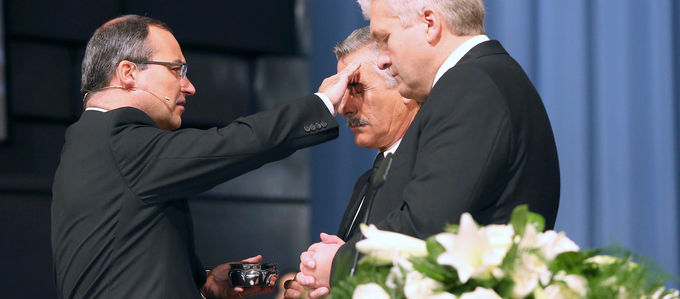
Now that we have answered the what, how, where, and when, we still have to ask the question of who: who is permitted to dispense Holy Communion? And this time, the Christian churches actually all seem to have very similar answers—albeit with differing justifications.
In the New Apostolic Church, the case is clear: only ordained ministers are authorised to speak and act in the name of God. In addition to the Apostles, the authority to dispense Holy Communion has only been conferred upon priestly ministers. It is here the Church invokes its apostolicity: Jesus has given this authority to the Apostle ministry. And in the New Apostolic Church this ministry is once again personally occupied.
The Catholic, Orthodox, and Anglican Churches see things in a very similar way: only ordained Priests and Bishops are allowed to celebrate the Eucharist, or Divine Liturgy, as it is also known. All of them likewise invoke their apostolicity, albeit after a different fashion, namely by way of apostolic succession. This means that they derive the authority of their clergy from the notion that the ordination of bishops through laying on of hands can be traced all the way back to the time of the biblical Apostles in an uninterrupted progression.
Differences between theory and practice
According to the Protestant understanding, any baptised Christian could preside over the celebration of Holy Communion—at least in theoretical-theological terms. This follows from the doctrine of the universal priesthood or the priesthood of all believers. Things are usually different in practice, however. According to canon law, only those who have been ordained for the purpose—that is, the pastors, both male and female—are permitted to publicly proclaim the word of God and preside over the Lord’s Supper.
Some churches allow exceptions to varying degrees: in some cases, clergymen in training can celebrate the sacrament under the supervision of their instructors. In some places, specially trained lay preachers are also allowed to preside over the celebration of the Lord’s Supper.
A distinction between consecration and dispensation
Both the consecration and the dispensation of the elements of Communion are reserved for ordained ministers in the New Apostolic Church. Most other churches, on the other hand, make a distinction between the consecration of the elements and the dispensation of these elements to the recipients, in other words, they distinguish between institution and communion.
In the case of the Catholics, for example, the dispensation is in principle performed by ordained clergy, which includes the deacons. Lay people are also permitted: some with standing orders (acolytes), others on missions that are limited in duration and place (extraordinary ministers of Holy Communion).
In the Protestant churches, non-clergy may also be allowed to dispense bread and wine. In most cases, members of congregational boards are appointed to this task. In Reformed congregations, the believers are even permitted to dispense the elements to one another.
Distinguishing between the local community and the universal church
There is a good reason why the act of presiding over the Lord’s Supper has been laid into hands expressly designated for this purpose: “It is Christ who invites to the meal and who presides at it,” the document on Baptism, Eucharist and Ministry (BEM) of 1982 states, which documents these ecumenical commonalities: “In most churches, this presidency is signified by an ordained minister. The one who presides at the eucharistic celebration in the name of Christ makes clear that the rite is not the assemblies’ own creation or possession; the Eucharist is received as a gift from Christ living in his church. The minister of the Eucharist is the ambassador who represents the divine initiative and expresses the connection of the local community with other local communities in the universal church.”
However, this was only half of the answer to the question of who. After all, in addition to the person dispensing the sacrament, the recipient is also an important part of the equation: who is permitted to go to Holy Communion? This is a hot topic that says a lot about the barriers between the denominations. The next issues in this series will shed light on these aspects.
Photo: NAC Southeast Asia














